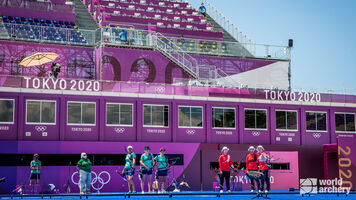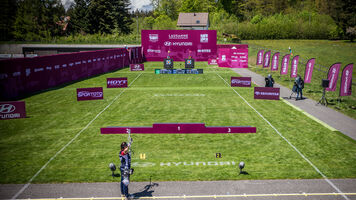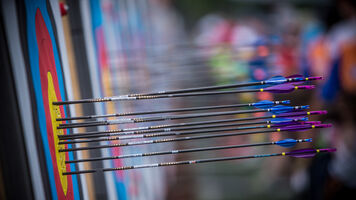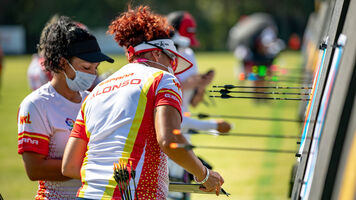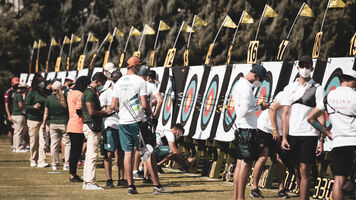Olympic dreams and a worldwide pandemic collide
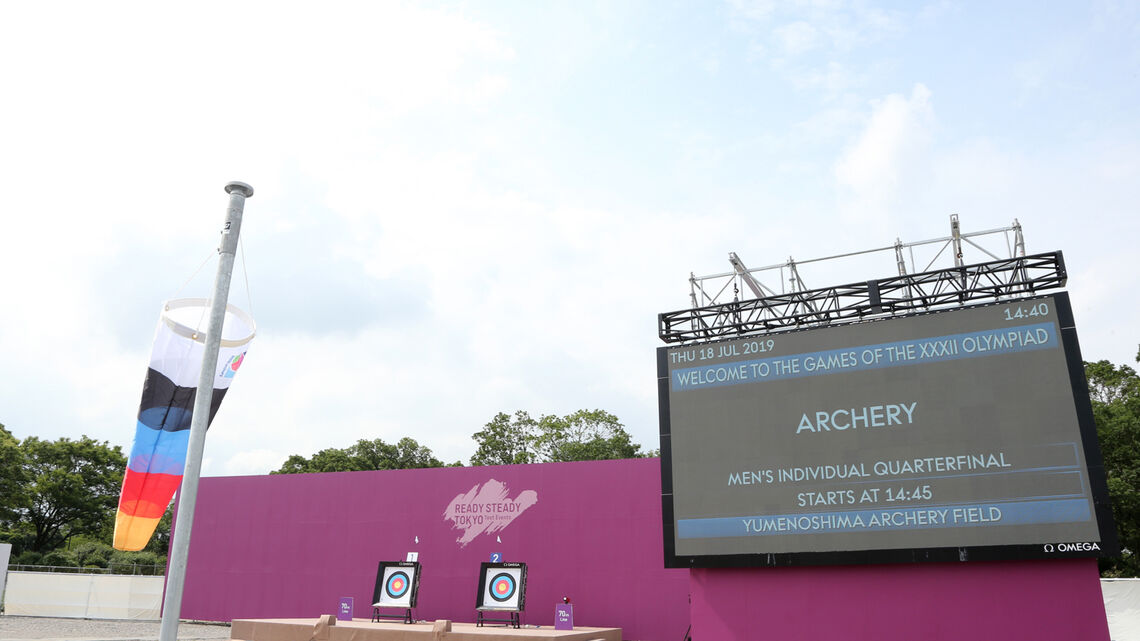
“I was quite serious at the time,” Naomi Folkard insists.
She wasn’t bluffing. She really did contemplate retiring after the Rio 2016 Olympic Games.
The decorated recurve archer was just 20 years old when she attended her first Olympics, as the youngest member of the Great Britain archery team at Athens 2004.
Rio was her fourth Olympics, and her fourth appearance on archery’s biggest stage – the culmination of a fourth four–year training cycle.
A career-best ascension to the quarterfinals, she determined, wasn’t enough to keep her around. Folkard was 32 years old and ready for something different. She wanted something new. She wanted a life outside of competitive archery.
“Everything you do revolves around your sport,” explained Folkard, who made her international debut in 1996, at the age of 12. “Every decision you make, you have to think, ‘Does it affect my archery?’ Is it going to impede or impact my sport?’”
But a series of fortuitous incidents conspired to keep her around. First, Folkard’s boyfriend, Jon, entered her into a competition without her knowledge, rekindling a love of shooting that she’d thought was left behind. Then she accepted a grant from UK Sport for her efforts, signalling a willingness to consider other options.
“That’s a really huge carrot to dangle,” she said, recalling her shift in attitude. “Suddenly, before I knew it, I wasn’t retired anymore.”

Turns out, she still had more to offer. In June 2019, Folkard joined teammates Bryony Pitman and Sarah Bettles to win bronze at the Hyundai World Archery Championships in the Netherlands. Her performance “in ’s-Hertogenbosch also assured Great Britain of the maximum number of quota places for next year’s Tokyo Olympics”, the UK press reported.
“Assured”, of course, had a different meaning back then. Qualifying for the Olympics is difficult enough, after all, without having a pandemic virus to account for. But after resisting the temptation to quit and succumbing to the allure of an Olympic medal, Folkard, 37, finds herself at a crossroads once again.
“So much work goes into getting ready for an Olympics, and now it’s in jeopardy because of the pandemic,” Folkard said recently. “Everything has become so sporadic. We’ve had to look at things entirely differently.”
The Olympic Games, perhaps the most complex event to organise in the world, are just one of the many major occasions affected by the COVID-19 outbreak. Preparations have been delayed, facilities have closed and opened and closed again, and all sorts of questions have proliferated.
Confronted by the disruption in their schedules and the growing obstacles to training imposed by the virus, archers aiming to win a medal in Tokyo are adjusting on the fly as they grapple with this unexpected shift in reality.
“It’s definitely taken some getting used to,” said the USA’s Casey Kaufhold, who has trained in solitude throughout much of quarantine. “You work so hard, and then everything changes so abruptly. It’s hard to keep your goals in check when you can’t predict the future.”
Determining who earns a spot on the podium is, of course, far from the only issue in the world.
But for athletes whose lives are catered with precision around the pursuit of a prize awarded every four years – missing weddings, funerals and other meaningful events in the process – the upheaval and uncertainty has been difficult to reconcile.
“All we think about is the Olympics,” Folkard said. “That’s the goal. That’s what we want. That’s what makes archery come on the telly. If you want to be remembered, it has to be done at the Olympics.”
In this sense, athletes who are normally observed with a sense of wonder now appear more relatable than ever. While Olympians are exceptional by nature, accomplishing feats of athleticism that outsiders will never fully comprehend, the anxiety surrounding the Games makes them representative of so many people whose lives have been forced into disarray by the pandemic.
“It’s hard to be told that your biggest goal in life is going to have to wait,” said Kaufhold, 16, who is looking to attend her first Olympics as one of the youngest competitors in the USA delegation.
“I’m just so eager to get that spot filled. I know I’ll have plenty of chances to make an Olympic team, but I still want to get the experience now, when I’m young, to see how much I can grow from each Games and see how many teams I can make.”

Unlike established athletes eyeing a return to the Olympics, Kaufhold has perhaps more to gain from an extra year before the selection process resumes next spring.
“Seeing the progress that I’ve made over the past year, I do have goals set up,” Kaufhold conceded.As an athlete who has yet to reach anything resembling a plateau in her development, the pandemic doesn’t represent an impediment, but an opportunity.
“For me, it all goes back to the goal of having that Olympic gold medal. That’s what I want more than anything in this world,” Kaufhold continued. “To wake up every morning and know that I have the power to work hard to get there is what keeps me shooting. That’s what has kept me going every day.”
Finding motivation hasn’t been difficult for Kaufhold, whose main goal this season is to keep improving at the rate she has since establishing herself at such a young age.
At the 2019 USA Nationals, Kaufhold broke the recurve junior women’s Double 70-metre record, shooting 1314 out of a possible 1440. Then, one year later, she upped it with a score of 1338.
Assuming Kaufhold follows a similar trajectory along this revised calendar, an additional year of development could be the difference between her competing in Tokyo and waiting another three years to make her Olympic debut.
“Looking at the progress I made from last year to this year, having a whole other year to improve even more is something I’m very grateful for,” Kaufhold said. “I feel confident in my skill set at the moment, and hopefully it’ll carry into next year even better.”
Who benefits most from the postponement is ultimately a matter of perspective. While Kaufhold has gained an extra year to hone her craft, past interruptions might provide a sense of hope for more experienced medal candidates.
“I’ve been through so much in my career. I don’t think it will affect me at all,” said world number one archer Brady Ellison, who as a child suffered from Perthes disease, a condition that affects the hip and required him to wear leg braces when he was a child.
“I’ve already been there, done that,” the 31-year-old American said. “I know how to shoot my bow. I know what to do. I can’t imagine a scenario where the delay is going to be a problem.”
The circumstances surrounding his training, however, have changed. Before Ellison gets a fourth crack at an Olympic individual gold medal, he will have no choice but to adapt as he prepares for fatherhood with one eye still on the Olympics.
Ellison and his wife, Toja, are expecting their first child in December. This was not originally their plan.
Rather than meeting their son, Tyler, with the Olympics firmly behind him, the postponement of the Games means Ellison will be juggling the responsibilities of being a new dad when he steps to the line next summer in pursuit of the individual Olympic gold medal that has eluded him during an otherwise exemplary career.
“I think it’s going to be better,” said Ellison, who won an individual bronze and team silver medals in 2016. “Hopefully I’ll hear him cheering me on.”
When asked if the responsibilities of raising a newborn could inhibit his ability to perform, Ellison was steadfast in his resolve to persevere and contend for a gold medal without any complications. Amid all of the uncertainties saddling the postponement of the Games, his hunger for an Olympic medal remains strong.

“I don’t think it will affect me at all, really,” said Ellison, who has long considered his focus and mental discipline to be his greatest strengths. “I can’t imagine in any way, shape, or form that my performance is going to have anything negative attached to it.”
Ellison said it had always been their aim for Toja to be at a point in the pregnancy where she could attend the Olympics. While the timeline has been distorted, he said, the outcome is ultimately the same.
“It would have been perfect either way,” Ellison said. “Everything is still lined up so we can continue doing what we’re doing. Now we’ll just have an amazing bundle of joy along with us.”
Other archers have taken the postponement similarly in stride. While many Olympians were devastated by the news of the postponement, one medal contender was quietly thrilled.
Last year, at the national finals in Germany, an MRI scan revealed a tear in Rio 2016 silver medalist Lisa Unruh’s shoulder. The timing couldn’t have been worse. After undergoing surgery last October, recovering in time for the Olympics appeared out of the question.
But COVID-19 has changed the equation. Unruh’s relief was palpable when she learned about the Olympics being postponed. Because of the virus, she can take the time she needs to complete her physical therapy.
“My first reaction was pure happiness,” said Unruh, 32, who became the first German archer to claim an individual medal with her showing in Rio. “I’m very grateful. Eight years would have been too long to wait.”
Like Unruh, Folkard’s wealth of experience is leaving her optimistic that she will adjust to the postponement accordingly. While training and rehabbing in the shadow of a pandemic comes with its unique set of challenges, there is a level of confidence internally that the lessons learned over the course of a long career will serve them well.

“The fact that I have been competing well and did win medals last year makes me feel that it was worth it,” Folkard said. “Especially for our team. We won all six Olympic places at Worlds last year. To be able to be part of that and to give back to the team as a whole is really important to me.”
Similar to Folkard, Korean man Oh Jin Hyek, now aged 38, has decided to delay his retirement for one more shot at Olympic glory. But others, like Germany’s Elena Richter, have elected not to join their teammates in Tokyo.
“Even if there is going to be an Olympic Games next year, I don’t see how it will happen in a way that we’re used to,” Richter said. “I don’t see an Olympic Ceremony happening, or that we will all live in the Village – that there will be 10,000 people having lunch all at the same time.”
“I just don’t think it’s going to happen.”
Under normal circumstances, Richter would have gladly withstood another year of intense training and competition before retiring. But there is no assurance that she will be allowed to take part a year from now, she said, and stubbornly trying to do so might exacerbate the spread of the virus.
While the potential medalist found the Games alluring, Richter couldn’t envision maintaining the sustained intensity for another year.
“I could have thought my job was over, I suppose,” Folkard pontificated. “But because we have such a good team, we’ve got a really good chance of winning an Olympic medal together, and I don’t want to give that up for anything.”
So Folkard will wait a year, when it is hoped that the world will have emerged from the worst of the pandemic, and put her training to the test. The upshot, she noted, is that the sustained intensity of an extra year will be offset by a shorter wait leading up to 2024, when Paris assumes control of the Summer Olympics spotlight.
At which point a new carrot will be dangled in front of her.
“Because three years is less than four years, right?” Folkard said, only half-kiddingly.
Once again, this pandemic has changed the equation.
“I’m not going to commit to anything,” she cautioned. “Right now, I think that’s the safest thing to do.”






